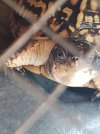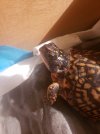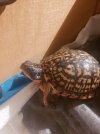imo , deficiencies is why it's a good idea to get them eating good quality commercial pellets , cat food or dog food along with natural foods ......soaking all the time has appeared to me to happen when they don't feel good .......make sure she has a good place to hide/feel safe , stress imo should be kept to a minimum ........ in the fall all my turtles get offered yams and beef liver more than usual .......
You are using an out of date browser. It may not display this or other websites correctly.
You should upgrade or use an alternative browser.
You should upgrade or use an alternative browser.
Need ideas for box turtle pond
- Thread starter Barber25
- Start date
ZenHerper
Well-Known Member
Though hypovitaminosis A can be one reason an abscess forms, the infection itself is bacterial. (Viral aural hematomas may present without the pus clump.)Kiwi had her surgery to remove the abscess yeaterday. The vet said it was the largest he had seen. in addition to the ear abscess on the left side, there apparently was also one on the right, which had allowed must of the mass to come out, leaving a hardened plug. These abscesses had formed quickly, over a period of a few months. the vet said they were not caused by bacteria, but more from a lack of vitamin A? Ive ordered some drops and will use those from now on. I've brought her back into her indoor box, and the vet says no substrate for the 2 week healing time. so Im using paper towels...ahe seems more active than ever, and ia apending almost all of the time (even at 3 am!) sitting in the water basin. when I give her food, she sits on it immediately...but havent seen her eat. Like I said, seems more active and less skittish toward me than ever...but her skin seems papery and yellowish (not head and legs, but the connective parts...but perhaps its the indoor lighting? Waiting patiently for a bowel movement to bring in for a parasite check. Im hoping the vitamin A prevents this ordeal in the future
Injuries (bites, scratches, etc.), poor diet (turts that don't eat greens, squash, pellets, or sweet potatoes), immune dysfunction (including post-brummation syndrome), soiled living conditions, stress (overcrowding, overhandling, too dry, no UVB, blah), and over-exposure to pesticides (that inhibit vitamin A absorption)...more or less a complete list of suspected/assumed causes.
Basically anything that will depress/overwhelm immune function and circulation.
Do a good daily soak in shallow water under observation (no swimming). Provide a few hide boxes.
Be wary of anti-parasitic treatments in otherwise gut-healthy turtles (normal stool appearance and no visible worms)...the drugs can bork the digestive flora. If you go this route, give a reptile-labelled probiotic supplement during and for a month after treatment ends.
@TeamZissou has some insight on which form of vitamin A is safe to supplement long term...if the diet includes a variety of vitamin A-containing foods, supplementation is unnecessary and another cause of the illness should be sought.
thanks for the info!Though hypovitaminosis A can be one reason an abscess forms, the infection itself is bacterial. (Viral aural hematomas may present without the pus clump.)
Injuries (bites, scratches, etc.), poor diet (turts that don't eat greens, squash, pellets, or sweet potatoes), immune dysfunction (including post-brummation syndrome), soiled living conditions, stress (overcrowding, overhandling, too dry, no UVB, blah), and over-exposure to pesticides (that inhibit vitamin A absorption)...more or less a complete list of suspected/assumed causes.
Basically anything that will depress/overwhelm immune function and circulation.
Do a good daily soak in shallow water under observation (no swimming). Provide a few hide boxes.
Be wary of anti-parasitic treatments in otherwise gut-healthy turtles (normal stool appearance and no visible worms)...the drugs can bork the digestive flora. If you go this route, give a reptile-labelled probiotic supplement during and for a month after treatment ends.
@TeamZissou has some insight on which form of vitamin A is safe to supplement long term...if the diet includes a variety of vitamin A-containing foods, supplementation is unnecessary and another cause of the illness should be sought.
ive attached a pic that ahows the skin on the neck..looks thin, yellowish, and paper-y weird to me
Attachments
ZenHerper
Well-Known Member
Turtles do shed their skin. If the skin looks healthy, just loose, it's probably fine.
Looks fine to me.
TeamZissou
Well-Known Member
Though hypovitaminosis A can be one reason an abscess forms, the infection itself is bacterial. (Viral aural hematomas may present without the pus clump.)
Injuries (bites, scratches, etc.), poor diet (turts that don't eat greens, squash, pellets, or sweet potatoes), immune dysfunction (including post-brummation syndrome), soiled living conditions, stress (overcrowding, overhandling, too dry, no UVB, blah), and over-exposure to pesticides (that inhibit vitamin A absorption)...more or less a complete list of suspected/assumed causes.
Basically anything that will depress/overwhelm immune function and circulation.
Do a good daily soak in shallow water under observation (no swimming). Provide a few hide boxes.
Be wary of anti-parasitic treatments in otherwise gut-healthy turtles (normal stool appearance and no visible worms)...the drugs can bork the digestive flora. If you go this route, give a reptile-labelled probiotic supplement during and for a month after treatment ends.
@TeamZissou has some insight on which form of vitamin A is safe to supplement long term...if the diet includes a variety of vitamin A-containing foods, supplementation is unnecessary and another cause of the illness should be sought.
Tortoises are sensitive to Hypervitaminosis A through supplmentation with the more powerful form of vitamin A, retinyl acetate. Beta carotene, a precursor for vitamin A production in the body is safer since any extra will be excreted rather than built up to cause Hypervitaminosis problems like skin peeling or eye issues. That said, if your turtle has Hypovitaminosis vitamin A, it could probably tolerate retinyl acetate, tough risk of overdose is still there with many of the vitamin products on the market which provide mega doses. I would however stick to Rep-Cal Herptivite since it contains beta carotene rather than retinly acetate. Fluker's Reptile Vitamin would probably be OK for turtles in this case as well since it's on the lower end of retinyl acetate compared to all the other products on the market.
This might not have been a problem if you turtle ate some greens once in while. It's tough to say what they get in terms of greens if you don't see them every day, don't view them eating it, and feed mainly live food. I would put some of the Herptivite on a worm or whatever live food once or twice a week.
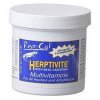
ZenHerper
Well-Known Member
BTW: Do you know if anyone has tried or had success with using Copaiba oil in turtles? I've seen references to use with Redfoot abscesses -- but the plant is indigenous to their territories.Looks fine to me.
My suspicion is that most *surprise!* turtle abscesses start in the mouth where the icky microbes are hanging out. If there were a safe (plant-based) antimicrobial that could periodically (to prevent gut sterilization) be put in water or food, it might prevent a number of infections in immune-borderline animals that otherwise have good environmental and dietary care. It would also be nice to have some way to prevent re-infection in animals that get sedated and cleaned out repeatedly.
The amounts of vitamin C that box turtles consume seems insufficient where oral disinfection is concerned...
it just seemed to happen so suddenly, after the anesthesia and surgeryTurtles do shed their skin. If the skin looks healthy, just loose, it's probably fine.
I'm going to check out this oil, recomendations for vitamin C and vitamin A..dont want to go through this again, nor have the turtle subjected to this ordeal againBTW: Do you know if anyone has tried or had success with using Copaiba oil in turtles? I've seen references to use with Redfoot abscesses -- but the plant is indigenous to their territories.
My suspicion is that most *surprise!* turtle abscesses start in the mouth where the icky microbes are hanging out. If there were a safe (plant-based) antimicrobial that could periodically (to prevent gut sterilization) be put in water or food, it might prevent a number of infections in immune-borderline animals that otherwise have good environmental and dietary care. It would also be nice to have some way to prevent re-infection in animals that get sedated and cleaned out repeatedly.
The amounts of vitamin C that box turtles consume seems insufficient where oral disinfection is concerned...
other than a few berries and boiled eggs, Ive only seen her eat worms and grasshoppers...no greens...so dusting seems to be the answerTortoises are sensitive to Hypervitaminosis A through supplmentation with the more powerful form of vitamin A, retinyl acetate. Beta carotene, a precursor for vitamin A production in the body is safer since any extra will be excreted rather than built up to cause Hypervitaminosis problems like skin peeling or eye issues. That said, if your turtle has Hypovitaminosis vitamin A, it could probably tolerate retinyl acetate, tough risk of overdose is still there with many of the vitamin products on the market which provide mega doses. I would however stick to Rep-Cal Herptivite since it contains beta carotene rather than retinly acetate. Fluker's Reptile Vitamin would probably be OK for turtles in this case as well since it's on the lower end of retinyl acetate compared to all the other products on the market.
This might not have been a problem if you turtle ate some greens once in while. It's tough to say what they get in terms of greens if you don't see them every day, don't view them eating it, and feed mainly live food. I would put some of the Herptivite on a worm or whatever live food once or twice a week.
View attachment 332556
ZenHerper
Well-Known Member
Be cautious...I don't have experience with Copaiba in any species. Essential oils are very concentrated and anything effective against strep, staph, and pseudomonas will kill off digestive flora (part of the immune system).I'm going to check out this oil, recomendations for vitamin C and vitamin A..dont want to go through this again, nor have the turtle subjected to this ordeal again
Refresh your substrate while she's on paper...clean the enclosure carefully and thoroughly. Change water containers at least daily so that stool and urine are not feeding opportunistic microbes.
For animals living outdoors, it is important that water is fresh (and refreshed) daily. Consider whether pesticides have been used on the property (or on neighboring properties). Consider whether an enclosure is staying stagnantly wet (and colonized by infective microbes).
Vitamin C *should* be covered with fresh berries. It is a good antiviral, but probably not all that strong against meaner strains of bacteria.
Grasshoppers and other insects that eat plants pass on varying amounts of vitamins to the animals that eat them.
Grasshopper nutrition facts and analysis.
Unfortunately, there are lots of meritorious guesses about abscesses...but any One Exact Cause of any single abscess event can be hard to identify with 100% certainty. Since the pus plug goes all the way from the mouth end of the ear canal to the cheek, it is completely possible for many re-occurences to be due to inexperienced surgeons not removing the entire curd. (I'm also not a fan of stitching the skin closed so the wound can be irrigated and kept oxygenated while healing.)
You do the best you can.
Like I said, turtles shed (about annually)...the vet visit may just be a coincidence, or the stress kicked the process into gear. If it looks like dry loose skin, just keep it under observation. It will eventually crack and drop away on its own, leaving fresh, strong skin underneath. Don't peel it.
overnight it looked like the skin became detached (other than head and limbs) more concerned now..vet said 100% sure not bacteria, and I need to find out if it was closed and everything was removed.Be cautious...I don't have experience with Copaiba in any species. Essential oils are very concentrated and anything effective against strep, staph, and pseudomonas will kill off digestive flora (part of the immune system).
Refresh your substrate while she's on paper...clean the enclosure carefully and thoroughly. Change water containers at least daily so that stool and urine are not feeding opportunistic microbes.
For animals living outdoors, it is important that water is fresh (and refreshed) daily. Consider whether pesticides have been used on the property (or on neighboring properties). Consider whether an enclosure is staying stagnantly wet (and colonized by infective microbes).
Vitamin C *should* be covered with fresh berries. It is a good antiviral, but probably not all that strong against meaner strains of bacteria.
Grasshoppers and other insects that eat plants pass on varying amounts of vitamins to the animals that eat them.
Grasshopper nutrition facts and analysis.
www.nutritionvalue.org
Unfortunately, there are lots of meritorious guesses about abscesses...but any One Exact Cause of any single abscess event can be hard to identify with 100% certainty. Since the pus plug goes all the way from the mouth end of the ear canal to the cheek, it is completely possible for many re-occurences to be due to inexperienced surgeons not removing the entire curd. (I'm also not a fan of stitching the skin closed so the wound can be irrigated and kept oxygenated while healing.)
You do the best you can.
Like I said, turtles shed (about annually)...the vet visit may just be a coincidence, or the stress kicked the process into gear. If it looks like dry loose skin, just keep it under observation. It will eventually crack and drop away on its own, leaving fresh, strong skin underneath. Don't peel it.
ZenHerper
Well-Known Member
Photos...
I was referring to what HAD happened, not something new, ILl try to get a better photo than the one I previously posted
ZenHerper
Well-Known Member
lol
Now I'm not sure if we're talking about the abscess or the neck/leg skin. =DD
The abscess was absolutely filled with pus...which only develops when there is a bacterial (or fungal) infection. The only way to say what kind of microbe was in the ear canal was to send the pus plug out to the lab to incubate and identify the microbes.
The main reason to go through the expense of a lab analysis is to determine if the infecting microbe is a natural part of the animal's body flora (that took advantage of some immune suppression), or if it is a foreign invader. I'd go this route if an abscess returns despite all best efforts to tighten up environmental and dietary features.
The whole story about pus here (ours is usually liquid, but reptiles - and rabbits - get solid clumps):
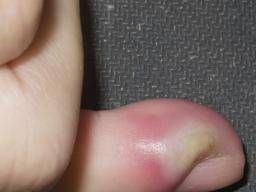
 www.medicalnewstoday.com
www.medicalnewstoday.com
Not sure how your vet knew for 100% certain what the Original cause of the infection was without blood testing (for vitamin A deficiency) since there are so many things that are theoretically to blame. This is his Best Guess Hunch, and not a bad one, as far as hunches go. But not 100%.
Captive water turtles that don't eat fortified pellets and live in dirty water get abscesses a lot...but the diet and the environment conspire together to cause the infection of the ear canal.
Hypovitaminosis A is generalized to be the inciting issue for all turtles since the inside lining of the ear canal can be affected as much as the outer skin. The deteriorated lining makes a gunked up place for microbes to set up housekeeping where the immune system can't reach. But water turtles on balanced diets also get abscesses when they live in dirty water since the microbial overgrowth gets into their mouths all day long...eventually something gets into the ear canal. Likewise terrestrial turtles can be on balanced diets and get abscesses.
It can be a quick one-off problem solve, or it can be a process of elimination.
From the UPenn veterinary school:
Now I'm not sure if we're talking about the abscess or the neck/leg skin. =DD
The abscess was absolutely filled with pus...which only develops when there is a bacterial (or fungal) infection. The only way to say what kind of microbe was in the ear canal was to send the pus plug out to the lab to incubate and identify the microbes.
The main reason to go through the expense of a lab analysis is to determine if the infecting microbe is a natural part of the animal's body flora (that took advantage of some immune suppression), or if it is a foreign invader. I'd go this route if an abscess returns despite all best efforts to tighten up environmental and dietary features.
The whole story about pus here (ours is usually liquid, but reptiles - and rabbits - get solid clumps):

Pus: What is it and why does it happen?
Pus is a protein-rich fluid called liquor puris that is filled with dead, white blood cells that the body has sent to fight infection. Pus is a natural result of the body fighting infection and can be yellow, green, or brown. Sometimes, it has a foul odor. Pus that appears after surgery may be...
 www.medicalnewstoday.com
www.medicalnewstoday.com
Not sure how your vet knew for 100% certain what the Original cause of the infection was without blood testing (for vitamin A deficiency) since there are so many things that are theoretically to blame. This is his Best Guess Hunch, and not a bad one, as far as hunches go. But not 100%.
Captive water turtles that don't eat fortified pellets and live in dirty water get abscesses a lot...but the diet and the environment conspire together to cause the infection of the ear canal.
Hypovitaminosis A is generalized to be the inciting issue for all turtles since the inside lining of the ear canal can be affected as much as the outer skin. The deteriorated lining makes a gunked up place for microbes to set up housekeeping where the immune system can't reach. But water turtles on balanced diets also get abscesses when they live in dirty water since the microbial overgrowth gets into their mouths all day long...eventually something gets into the ear canal. Likewise terrestrial turtles can be on balanced diets and get abscesses.
It can be a quick one-off problem solve, or it can be a process of elimination.
From the UPenn veterinary school:
Penn Vet | Fact Sheet Detail
Read the detail of Wildlife Futures fact sheets to learn more about disease types, causes, treatments, and management.
www.vet.upenn.edu
i've seen ear abcesses resolve themselves without treatment , i've seen them treated come back and resolve themselves without further treatment ....i've seen them treated without antibiotics and they too resolved ...... . the presence of bacteria doesn't mean it's the cause , last i knew the most likely thought cause was an inflamatory process caused by a deficiency ....... i'd tend to believe your vet , it's an inflamatory process ...... the sloughing of dead cells from the ear lining stimulates the immune response , the origin of that ear mass from any literature i've seen is dead cells ...... any bacteria in that mass is thought to be almost certainly secondary ....... bacteria is present practically everywhere on your turtle , i doubt they could not culture multiple types from any turtles mouth ear nose or throat .......can't make out a skin issue from your pic , but if it is a skin issue along with a ear issue , my thought would be an ADE injection .....
ZenHerper
Well-Known Member
Inflammation can resolve without surgery, either with or without treatment to its inciting cause.
An abscess is a walled-off glob of pus. In reptiles, this glob is not liquid: it cannot be taken back up by the body. A genuine abscess in the ear canal creates a plug that has to come out. Either surgically, or an animal tolerates its growth until the skin breaks (inside or outside) and the glob falls out (onto the ground, or into the mouth).
An abscess in the ear canal is intensely painful, causing most turtles to stop eating. The jaws and bones of the head can be displaced, and animals frequently die after suffering starvation.
An abscess is a walled-off glob of pus. In reptiles, this glob is not liquid: it cannot be taken back up by the body. A genuine abscess in the ear canal creates a plug that has to come out. Either surgically, or an animal tolerates its growth until the skin breaks (inside or outside) and the glob falls out (onto the ground, or into the mouth).
An abscess in the ear canal is intensely painful, causing most turtles to stop eating. The jaws and bones of the head can be displaced, and animals frequently die after suffering starvation.
the "stuff" in the abscess was like cottage cheese....I dont think she has eaten since the surgery thursday...just sits and soaks in the water. She does scramble over to squash the food however. The skin situation is a different issue...I noticed it after I brought her home...thought maybe it was from the stress, the anesthetic, or oversoaking. The skin didnt look right, or healthy, but again, I normally look at the shell, the limbs, the head, rather than the skin between, maybe I had juat never noticed....it looked thin, paper-y ...like it was separated from the body. Ill have to get a new pic. I just try not to bother her much during this ordeal. She seems very alert..just completely changed behavior..used to always hide in the hide, now always in the water basin
Attachments
ZenHerper
Well-Known Member
Soaked puppy pad - super smart idea! How does the cover make out with her nails?
Her skin may be dry just because of all the general stress and now she's up in the air more. I don't see anything worrying there. She may have lost weight too. That will make the skin looser than normal. Let her soak as much as she wants to; change the water several times a day to keep it clean.
Pic #2 looks like she still has significant swelling on both sides (artifact of her head tilt?). Ear abscesses are like abscessed teeth...very painful and make you uninterested in biting/chewing.
If you feel confident, you can syringe feed her...you kind of annoy the side of her mouth with the tip of the syringe until she opens, then drip a thick fluid food in from the side of the mouth, (not front-to-back). There are a couple of mix-with-water foods I like:
This comes with a cup and a wee syringe:
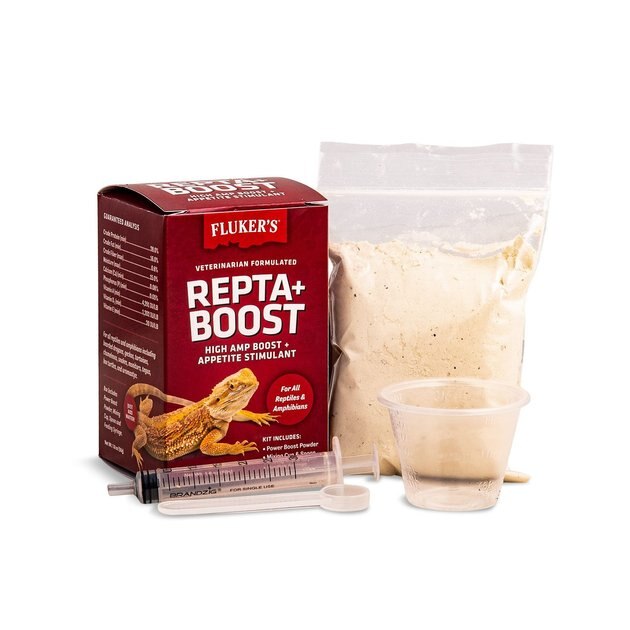
 www.chewy.com
www.chewy.com
This is a powder for sugar gliders that boxies like...it is made with honey and bee pollen:
 www.chewy.com
www.chewy.com
Even 1cc of supplemental feeding a day will help a lot...and the powders come with all the relevant vitamins and minerals. As with everything Reptile, you go slow. Keep her held level so she has to swallow down on purpose.
You could add baby food greens or supplemental powders to her soak waters. A lot more cleaning/rotating cycles.
Her skin may be dry just because of all the general stress and now she's up in the air more. I don't see anything worrying there. She may have lost weight too. That will make the skin looser than normal. Let her soak as much as she wants to; change the water several times a day to keep it clean.
Pic #2 looks like she still has significant swelling on both sides (artifact of her head tilt?). Ear abscesses are like abscessed teeth...very painful and make you uninterested in biting/chewing.
If you feel confident, you can syringe feed her...you kind of annoy the side of her mouth with the tip of the syringe until she opens, then drip a thick fluid food in from the side of the mouth, (not front-to-back). There are a couple of mix-with-water foods I like:
This comes with a cup and a wee syringe:

FLUKER'S Repta Boost Insectivore/Carnivore High Amp Boost Reptile Supplement, 1.8-oz - Chewy.com
Buy Fluker's Repta Boost Insectivore/Carnivore High Amp Boost Reptile Supplement, 1.8-oz at Chewy.com. FREE shipping and the BEST customer service!
This is a powder for sugar gliders that boxies like...it is made with honey and bee pollen:
EXOTIC NUTRITION Instant-HPW Honey & Fruit Sugar Glider Food, 8-oz bag - Chewy.com
Buy Exotic Nutrition Instant-HPW Honey & Fruit Sugar Glider Food, 8-oz bag at Chewy.com. FREE shipping and the BEST customer service!
Even 1cc of supplemental feeding a day will help a lot...and the powders come with all the relevant vitamins and minerals. As with everything Reptile, you go slow. Keep her held level so she has to swallow down on purpose.
You could add baby food greens or supplemental powders to her soak waters. A lot more cleaning/rotating cycles.
